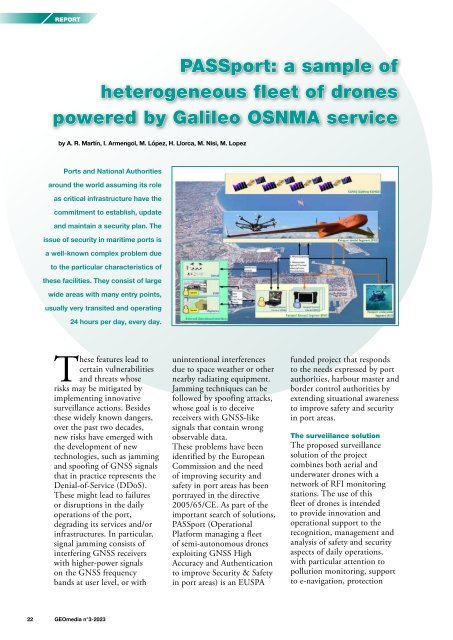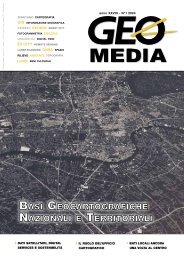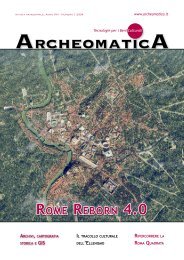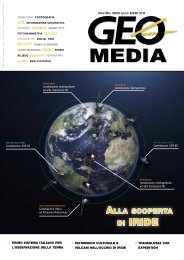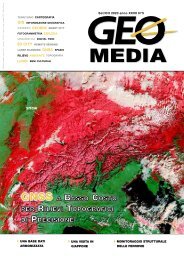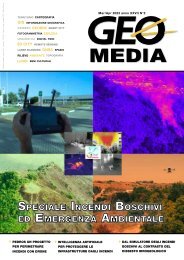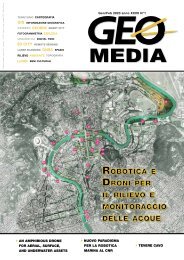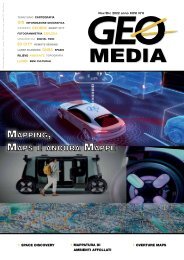GEOmedia_3_2023
EUMAP During the recent pandemic period, the world's attention has shifted towards the healthcare sector, with world leaders striving to avoid the collapse of their national healthcare systems; the economy has entered an artificial coma, while utility systems, including energy, water, telecommunications and waste management systems, have been asked to act immediately in response to these unprecedented conditions, placing extreme pressure on public utility systems.
EUMAP
During the recent pandemic period, the world's attention has shifted towards the healthcare sector, with world leaders striving to avoid the collapse of their national healthcare systems; the economy has entered an artificial coma, while utility systems, including energy, water, telecommunications and waste management systems, have been asked to act immediately in response to these unprecedented conditions, placing extreme pressure on public utility systems.
You also want an ePaper? Increase the reach of your titles
YUMPU automatically turns print PDFs into web optimized ePapers that Google loves.
REPORT<br />
PASSport: a sample of<br />
heterogeneous fleet of drones<br />
powered by Galileo OSNMA service<br />
by A. R. Martín, I. Armengol, M. López, H. Llorca, M. Nisi, M. Lopez<br />
Ports and National Authorities<br />
around the world assuming its role<br />
as critical infrastructure have the<br />
commitment to establish, update<br />
and maintain a security plan. The<br />
issue of security in maritime ports is<br />
a well-known complex problem due<br />
to the particular characteristics of<br />
these facilities. They consist of large<br />
wide areas with many entry points,<br />
usually very transited and operating<br />
24 hours per day, every day.<br />
These features lead to<br />
certain vulnerabilities<br />
and threats whose<br />
risks may be mitigated by<br />
implementing innovative<br />
surveillance actions. Besides<br />
these widely known dangers,<br />
over the past two decades,<br />
new risks have emerged with<br />
the development of new<br />
technologies, such as jamming<br />
and spoofing of GNSS signals<br />
that in practice represents the<br />
Denial-of-Service (DDoS).<br />
These might lead to failures<br />
or disruptions in the daily<br />
operations of the port,<br />
degrading its services and/or<br />
infrastructures. In particular,<br />
signal jamming consists of<br />
interfering GNSS receivers<br />
with higher-power signals<br />
on the GNSS frequency<br />
bands at user level, or with<br />
unintentional interferences<br />
due to space weather or other<br />
nearby radiating equipment.<br />
Jamming techniques can be<br />
followed by spoofing attacks,<br />
whose goal is to deceive<br />
receivers with GNSS-like<br />
signals that contain wrong<br />
observable data.<br />
These problems have been<br />
identified by the European<br />
Commission and the need<br />
of improving security and<br />
safety in port areas has been<br />
portrayed in the directive<br />
2005/65/CE. As part of the<br />
important search of solutions,<br />
PASSport (Operational<br />
Platform managing a fleet<br />
of semi-autonomous drones<br />
exploiting GNSS High<br />
Accuracy and Authentication<br />
to improve Security & Safety<br />
in port areas) is an EUSPA<br />
funded project that responds<br />
to the needs expressed by port<br />
authorities, harbour master and<br />
border control authorities by<br />
extending situational awareness<br />
to improve safety and security<br />
in port areas.<br />
The surveiilance solution<br />
The proposed surveillance<br />
solution of the project<br />
combines both aerial and<br />
underwater drones with a<br />
network of RFI monitoring<br />
stations. The use of this<br />
fleet of drones is intended<br />
to provide innovation and<br />
operational support to the<br />
recognition, management and<br />
analysis of safety and security<br />
aspects of daily operations,<br />
with particular attention to<br />
pollution monitoring, support<br />
to e-navigation, protection<br />
22 <strong>GEOmedia</strong> n°3-<strong>2023</strong>


